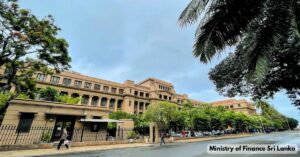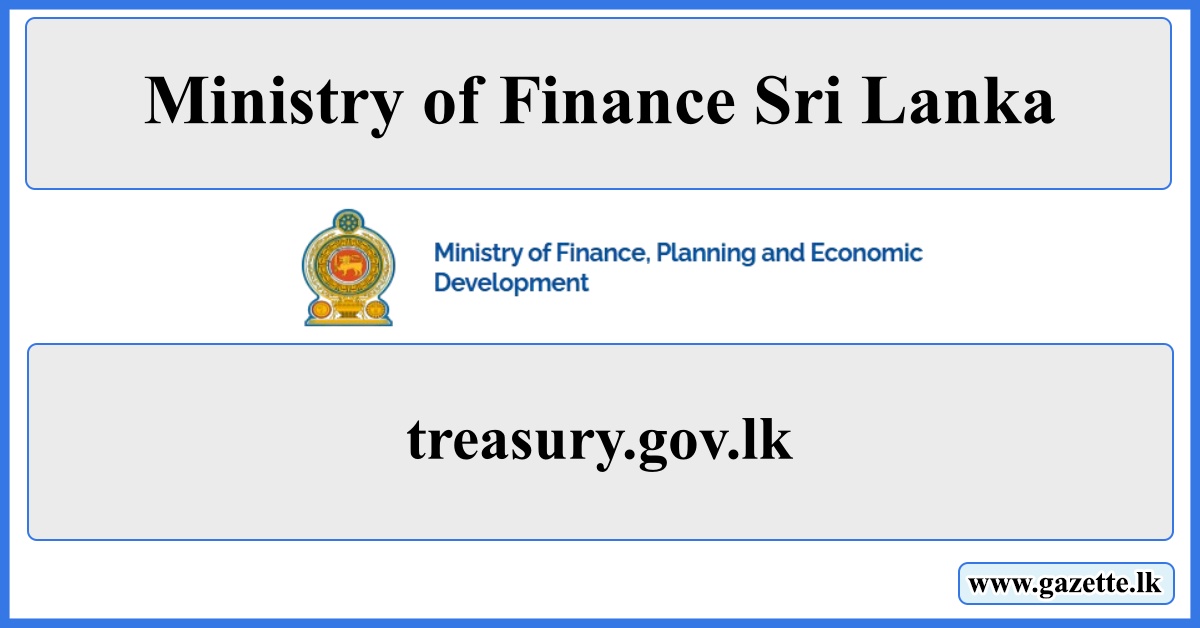Sri Lankan Ministry of Finance is a vital healthy organization entrusted with the harnessing of the country’s economic and fiscal affairs. With the strong influence of financial structure in Sri Lankan economy the ministry has a prominent responsibility of maintaining sound finance strategy, steering growth and managing over arching financial issues of the country.
What is the ministry, and who is the minister?
The central government fiscal policy maker and implementer of Sri Lanka is the Ministry of Finance. Its major responsibilities encompass coordination of fiscal policies, preparation of the nation’s budget, taxation, public expenditure and some aspects of financial control. The Ministry strives to bring on a balanced economic environment, which will complement the Nation’s development blueprint.
A nation’s ship of state is steered by the Minister of Finance and this essential institution vested with the task of charting Kenya’s economic destiny. President Anura Kumara Dissanayake is the Minister of Ministry of Finance since 24 September 2024. is a Sri Lankan politician who has served as the Minister of Foreign Affairs since September 2024. Apart from being the policy maker in the country, the Minister works closely with other government departments, international financial institutions and other players in the country towards financial stability and growth. This leadership entails to balance Sri Lanka’s fiscal problems, introduce foreign Investments and resolve public debt issues.
Who is the Current Finance Minister of Sri Lanka?
As of 2025, the Minister of Finance is [Update with current name – e.g., Hon. Shehan Semasinghe]. The Minister oversees national financial policy, budget preparation, public debt management, and fiscal administration across government institutions.
Interested in contributing to these national duties? Explore current Ministry of Finance job openings in Sri Lanka and start your public service career today.
Overview and Contact Information
| Established | 1947 |
| Headquarters | The Secretariat, Colombo 01, Sri Lanka |
| Jurisdiction | Government of Sri Lanka |
| Parent Agency | Government of Sri Lanka |
| Ministry | Ministry of Finance, Sri Lanka |
| Minister | President Anura Kumara Dissanayake (since 24 September 2024) |
| Address | Ministry of Finance, The Secretariat, Colombo 01, Sri Lanka. |
| Website | treasury.gov.lk |
| Telephone | +94 112 484 500, +94 112 484 600, +94 112 484 700 |
| Fax | +94 112 449 823 |
| info@mo.treasury.gov.lk | |
| X | Click Here |
| Click Here | |
| Important Links | |
| Economic Highlights Reports | Click Here |
| 2013 to 2025 Budget Estimates | Click Here |
| Gazettes | Click Here |
| Acts by Department | Click Here |
| Circulars by Department | Click Here |
|
Special Guidelines on Divestiture of State-Owned Enterprises (SOEs) |
Download PDF |
Annual Budget Summary—2025
| Approved Detailed Budget Estimate 2025 – Sinhala | Volume I | Download PDF |
| Approved Detailed Budget Estimate 2025 – Sinhala | Volume II | Download PDF |
| Approved Detailed Budget Estimate 2025 – Sinhala | Volume III | Download PDF |
| Approved Detailed Budget Estimate 2025—English | Volume I | Download PDF |
| Approved Detailed Budget Estimate 2025—English | Volume II | Download PDF |
| Approved Detailed Budget Estimate 2025—English | Volume III | Download PDF |
E-Services and Online Platforms
The ministry has embraced digital transformation through various e-government services:
-
Online Tax Services via IRD portal
-
e-Gazette circulars and publications
-
Tender & Procurement Announcements
-
Debt and Treasury Bond Auctions
-
Access to Budget Speeches, Economic Reports, and Development Plans
Visit the official website: https://www.treasury.gov.lk
Planning and Economic Development Initiatives
The Ministry works closely with other agencies and international partners to drive:
- Medium-Term Budgetary Frameworks (MTBF)
- National Development Strategies
- Poverty reduction and livelihood programs
- Programs for Macroeconomic Stabilisation
- Public-Private Cooperation Projects
To execute infrastructure development and economic reforms, it also collaboratively works with international financial institutions including the World Bank, ADB, and IMF.
Annual Reports and Publications
The Ministry regularly publishes:
-
Annual Reports
-
Performance Reports
-
Fiscal Management Reports
-
Economic Progress Reviews
These reports offer transparent insights into budget performance, policy implementation, and macroeconomic trends in Sri Lanka.
Circulars, Gazettes, and Acts
The Ministry is responsible for issuing essential financial documents such as:
-
Treasury Circulars
-
Special Gazettes
-
Acts of Parliament related to finance and fiscal policy
-
Pubthroughnce Management Acts
Additional Sections
Departments under the Ministry
-
Department of Treasury Operations
-
Department of Fiscal Policy
-
Department of National Budget
-
Department of Public Finance
-
Department of Management Services
These departments work together to ensure effective fiscal policy formulation and public sector management.
Main Duties in the Ministry
The Ministry of Finance is involved in virtually every aspect of efficacious management and regulation of the economic life of this nation. These include:
1. Preparing and Controlling the Budget
- Presenting the annual national budget and distributing resources to one sector or the other.
- Supervision of public spending with a view of exercising prudent expenditure of the available resources.
2. Revenue Collection
- Managing the taxation regimes including income tax, value added tax (VAT), and customs that are major sources of government’s revenue.
- Tax compliance to ensure that governments achieved their objective of getting revenue to fund national development.
3. Public Debt Management
- Coordinating the debt of the domestic and international in the funding of development projects and deficits in the budget.
- Achieving moderate and reasonable levels of debt that are sustainable but in the same respect observing fiscal prudience.
4. Economic Policy Formulation
- Considering the experience of previous years, the government needs to work on the following goals: economic development; decrease of the unemployment rate; the struggle against inflation.
- Working with other ministries and organizations to continue the changes in the economic affairs of a nation.
5. Diplomacy of financial institutions
- Supervision, overseeing and the controlling of banks, insurers, and other related financial institutions to enhance order in the financial market.
6. Investment and Trade Facilitation amongst international partners
- Promoting cross border investment through liberal policies in the FDIs and trade agreement to enhance economic development.
- The aim of expanding exports and improving export earnings for Sri Lanka and hence promoting its competitiveness in international markets.
7. Social Welfare Programs
- As the allocations of resources including poverty eradication and the funding of education, health, as well as working on infrastructure in order to enhance the standard of its citizens.
Why is it Important?
In this case, the Ministry of Finance is a key factor to Sri Lanka’s economy stability and expansion. Here are key reasons why it is essential:
- Economic Stability: It is important within the Ministry to ensure that the financial of the country are well utilized to enhance steadiness of the economy. This incorporates factors such as inflation, public debts, and fiscal responsibility.
- National Development: By budgeting and financial management, the Ministry provides financial resources for sectors including education, health and social needs which help in the progression of the country.
- Revenue Generation: Strategies and Policies in taxation and revenue collection of the Ministry also put into action channel ways necessary funds for public services/ development projects.
- Crisis Management: The Ministry in particular has a crucial role in managing potential leading shocks, both international recessions or domestic budgetary problems, that should not have serious effects for the economy.
- International Representation: It communicates the country’s economic needs to, and negotiates for loans and financial assistance from multilateral financial institutions, including the International Monetary Fund (IMF) and the World Bank.
Special Points in Ministry
The Ministry of Finance has unique attributes that distinguish it as a cornerstone of Sri Lanka’s governance:
Strategic Role in Economic Policy: As befits its functions, the Ministry that provides policies by which the economic development, export and import, as well as investment framework of the country is determined.
Public-Private Partnerships: It fosters partnership between government and businesses for the purpose of stimulating development, generating employment and improving on service delivery.
Transparency and Accountability: The Ministry has a clear policy about sound and welfare fiscal policies and reviews on expenditure and revenues of the government are also disclosed frequently.
Focus on Sustainable Development: The company embeds sustainability into economic management; it encourages and supports such programs as ecological.
Technology-Driven Reforms: Ministry uses technology development and application to raise tax administration, budget execution, and service delivery efficiency.
Support for SMEs:
Policies it implements help small and medium-sized businesses (SMEs), which are absolutely vital for job creation and economic development.
Conclusion
The Ministry of Fiscal Policy A fundamental institution influencing Sri Lanka’s financial and economic future is From national budget management to policy direction issuing, its influence permeates all spheres of government and progress. Acknowledging openness, digital services, and long-term economic planning more and more, the Ministry is instrumental in ensuring Sri Lanka’s financial stability and development.
FAQs About The Ministry
Q1: Of the Ministry of Finance’s several responsibilities, which one is most crucial for Sri Lanka?
The Ministry oversees national financial problems by means of funds and resource mobilization; it also manages and coordinates the country’s budget and controls its economic policies.
Q2: How does the Ministry help to facilitate national development?
The Ministry funds the development priority sectors including education, healthcare, and infrastructure in order to forward the idea of long-term sustainable development and so enhance people’s welfare.
Q3: What difficulties does the Ministry of Finance faces?
This involves controlling public borrowed resources, protecting and optimally collecting revenues, and harnessing incomes in the light of global volatilities.
Q4: In what ways does the Ministry help foreign investors?
The Ministry promotes FDIs by developing good policies, entering into trade partnerships, and offering incentives to global investors for investment in Sri Lanka.
Q5: What is the purpose availing the Minister of Finance?
Leading the Ministry in formulating economic policies, national budget preparation, and international financial negotiations representation for Sri Lanka, the Minister oversees
Q6: Where can I find current job vacancies in the Ministry of Finance?
You can find updated job openings, application deadlines, and qualifications on our dedicated Ministry of Finance Sri Lanka job vacancies page.



